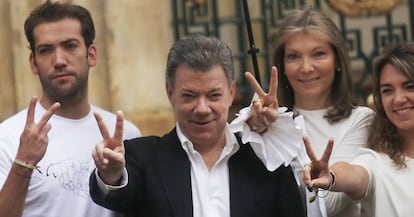Colombian President Juan Manuel Santos wins Nobel Peace Prize
News comes as surprise to many after Colombian voters rejected peace deal in plebiscite

The President of Colombia Juan Manuel Santos has been awarded the 2016 Nobel Peace Prize for his role in brokering a deal between the Government of Colombia and the Revolutionary Armed Forces of Colombia (FARC).
In awarding the prize to Santos, the Norwegian Nobel committee highlighted his “resolute efforts” to “bring the peace process forward” in a country punished by a 52-year civil war – a conflict that has cost the lives of at least 220,000 Colombians and displaced close to six million people.
“I receive this prize in the name of the Colombian people who have suffered so much during this war. I am grateful and overwhelmed,” Santos said when he heard the news.
The granting of the prize to Santos is a huge shot in the arm for a peace process that threatens to grind to a halt, coming as it does just days after voters in Colombia narrowly rejected the text of the peace deal between the government of Santos and the FARC.
A total of 50.21% of voters said no the agreement in a plebiscite that saw some 60% of voters abstain.
We are close to a final peace deal, and only have to stick with it during this final stage
President Santos
That shock result has plunged the country into political crisis with an initial meeting between Santos, Colombian president since 2010, and his predecessor Álvaro Uribe – the chief proponent of the ‘no’ campaign in the lead-up to the referendum – proving fruitless.
In recent days, Santos has described the current situation in the country as a “risky” state of limbo.
But Norwegian Nobel committee spokesperson Kaci Kullmann Five downplayed the negative result in the referendum saying it wasn’t a “vote against peace.”
“Those who voted no didn’t reject the desire for peace, rather they voted against a specific peace deal,” she added.
Opponents to the agreement, spearheaded by Uribe, have repeatedly criticized the fact that it would allow FARC members to enter mainstream politics and that members of the guerrilla group would not be imprisoned if they recognized they had committed crimes in the past.
But Kullmann Five stressed that “the fact that the majority of voters said no to the peace accord does not necessarily mean the peace process is dead.”
“We are close to a final deal, and only have to stick with it during this final stage, on behalf of the victims of war,” Santos said on Friday.
The Nobel committee hopes the peace prize will give Santos strength to succeed in this demanding task
The Norwegian Nobel committee said the prize for Santos was also a “tribute to the people of Colombia who, despite great hardships and abuses, have not given up hope of a just peace, and to all the parties who have contributed to this peace process.” The “countless victims” of the civil war also received a special mention.
“The committee hopes that the peace prize will give Santos strength to succeed in this demanding task. Further, it is the committee’s hope that in the years to come, the Colombian people will reap the fruits of the reconciliation process,” Kullmann Five said.
When the spokesperson was asked why FARC leader Rodrigo “Timochenko” Londoño had not shared the prize with Santos, Kullmann Five said the president had been the main driver of the process.
“President Santos has been taking the very first and historic initiative. There have been other tries, but this time he went all-in as leader of the government with a strong will to reach a result. That's why we have put the emphasis on president," she said.
I receive this prize in the name of the Colombian people who have suffered so much
President Santos
From a wealthy family, Santos served as defense minister under Uribe from 2002 to 2010. With the FARC weakened after US-backed offensives, Santos began negotiating with the guerilla group – a tactic that drove a wedge between him and his hardline predecessor.
In an exclusive interview with EL PAÍS in September, Santos said the process of brokering the peace deal “been a very difficult four years.”
“We were close to throwing in the towel. But this is an agreement that will change the history of Colombia,” he said.
Santos also used the interview to take aim at his fellow politicians. “The attitude of the victims has been one of the great lessons we have learned from this conflict. I thought they would be the hardest, but they have been the most generous, those most prepared to forgive. I don’t understand how my fellow politicians from the elite, because that is where I come from, are able to tell so many lies about the benefits of peace,” he said.
“I find it sad that there are people who don’t understand how important it is to move forward and leave a peaceful country to our children,” he added.
Santos is just the second South American to win the Nobel Peace Prize, with the first being Guatemalan political activist Rigoberta Menchú who received the award in 1992.
The prize-giving ceremony will be held in Oslo on December 10.
English version by George Mills.
Tu suscripción se está usando en otro dispositivo
¿Quieres añadir otro usuario a tu suscripción?
Si continúas leyendo en este dispositivo, no se podrá leer en el otro.
FlechaTu suscripción se está usando en otro dispositivo y solo puedes acceder a EL PAÍS desde un dispositivo a la vez.
Si quieres compartir tu cuenta, cambia tu suscripción a la modalidad Premium, así podrás añadir otro usuario. Cada uno accederá con su propia cuenta de email, lo que os permitirá personalizar vuestra experiencia en EL PAÍS.
¿Tienes una suscripción de empresa? Accede aquí para contratar más cuentas.
En el caso de no saber quién está usando tu cuenta, te recomendamos cambiar tu contraseña aquí.
Si decides continuar compartiendo tu cuenta, este mensaje se mostrará en tu dispositivo y en el de la otra persona que está usando tu cuenta de forma indefinida, afectando a tu experiencia de lectura. Puedes consultar aquí los términos y condiciones de la suscripción digital.









































